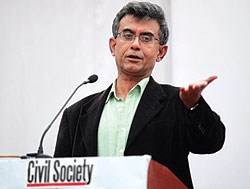|

|
|
Umesh Anand, Journalist
|
|
“Need processes, not slogans”
|
|
Mr Umesh Anand is the co-founder and publisher of Civil Society, an independent monthly magazine published from Delhi. He has worked with the several leading national dailies in the country. He speaks with
INDIA EMPIRE’ Sanjay Kaw in a freewheeling interview
|
|
|
What is your take on the prevailing political climate in the country ?
If there is chaos and confusion, it is because Indian political entities lack bipartisan approach to some of the crucial issues facing the country. So whether it is corruption or reforms, anti-poverty measures or inflation, there is much need to allow an elected Government to function. And at the same time hold it accountable.
What impact do you think the Anna Hazare movement has had on the country’s political playing fields?
The Anna Hazare movement, if it can be called a movement— in my view is not a movement—has served to highlight corruption through a clever use of sentiment and media. By the very nature of this approach, it is very unlikely to have a systemic impact. The systemic impact is only possible through dialogue. We are after all dealing with complex realities.
What are these complex realities?
Corruption does not have a single face. To assume there is corruption only in the political class is to trivialize the problem. While it is important to hold the political class accountable, it is also true that they are merely a part of a much larger system. For a long time now, we have had campaigns to decriminalize politics, put an end to money power and so on. Have they worked? If they have not worked, we need to ask ourselves why.
How can we weed out corruption from our system ?
Corruption needs to be addressed through processes, not slogans. Wherever societies have cleaned up their act, it has been through better processes. The problem with high voltage emotional appeals is that they tend to replace processes with slogans. For example, while the whole country is focused on the Jan Lokpal Bill, a much important and effective piece of legislation has been drafted and is today before the standing committee. It is called the Public Redressal Grievances Bill. This Bill looks at dealing with public grievances, which could be getting a driving license or a ration card or a document about your land, at the block, district and state levels. What it does is, it decentralizes accountability. Now while it has become common to talk about corruption, the fact is that vast majority of problems people have with Government services have nothing to do with corruption. They result merely from someone not doing his or her job. So there is a lot of talk about Lok Pal and sending people to jail, but the fact is that the Lok Pal can’t get your work done. You need a much less glamorous and more detailed approach to improve governance. It is also true that most ordinary folks don’t want to run around filing criminal cases over small matters. They want accountability and delivery. Finally, I think information technologies offer an enormous opportunity to put better processes in place.
What role the political parties should play to bring in an effective governance in both states and Centre ?
The only role they can play is the role they are elected to play. We need an impartial police force and impartial bureaucracy. We need basic services like healthcare, education, better roads, electricity etc. These should be the corner stone of improved Government.
What should be the role of the civil society in the present political scenario ?
There is no present or future role for civil society. Civil society is meant to protect and promote the values we cherish as a society. It is wrong for it to think that it can replace political class. Indeed, it should never seek to do so.
Many NRIs want to invest in the social sector. And what should be the role of the Government to encourage NRIs to invest in this sector ?
Nothing stops NRIs from investing in social sector. And the Government should have no role.
Back to politics. How can we strengthen our electoral process so that corrupt and criminals are debarred from contesting elections?
There is only one answer to bad politics and that is good politics. So, those who wish to cleanse the electoral system and have value-based politics in India should involve themselves in politics. Politicians work hard to win the approval of their constituencies. If we think they have strayed, we need to show a commitment needed for reaching out to real people so as to convince them that we are a better alternative.
Do civil society activists cross the line when they term all politicians as looters and criminals?
Yes. It has become common to abuse politicians because activists feel that this is the shortest way of getting public attention. There are two things wrong with this. First of all, short-cuts don’t deliver results. Secondly, not all politicians are despicable. By abusing them we do a disservice to democracy. A much more rationale and restrained approach is needed.
Do you think the Lok Pal matter has been handled properly by the Prime Minister and his team of advisors?
The Government has blundered in the way in which it has handled Jan Lok Pal issue. But having said that I wish to emphasize that I am not too sure that a Lok Pal is the answer to our problems. It is an outdated model with little proven capabilities, which the Anna Hazare agitation has emphasized without doing adequate homework. Even if you have a Lok Pal tomorrow, corruption would not go away. Indeed, if we get the kind of Lok Pal that Anna and his bunch want, we may actually be worse off.
|
|
|
|
March 2012
|
|


|
|
|
|